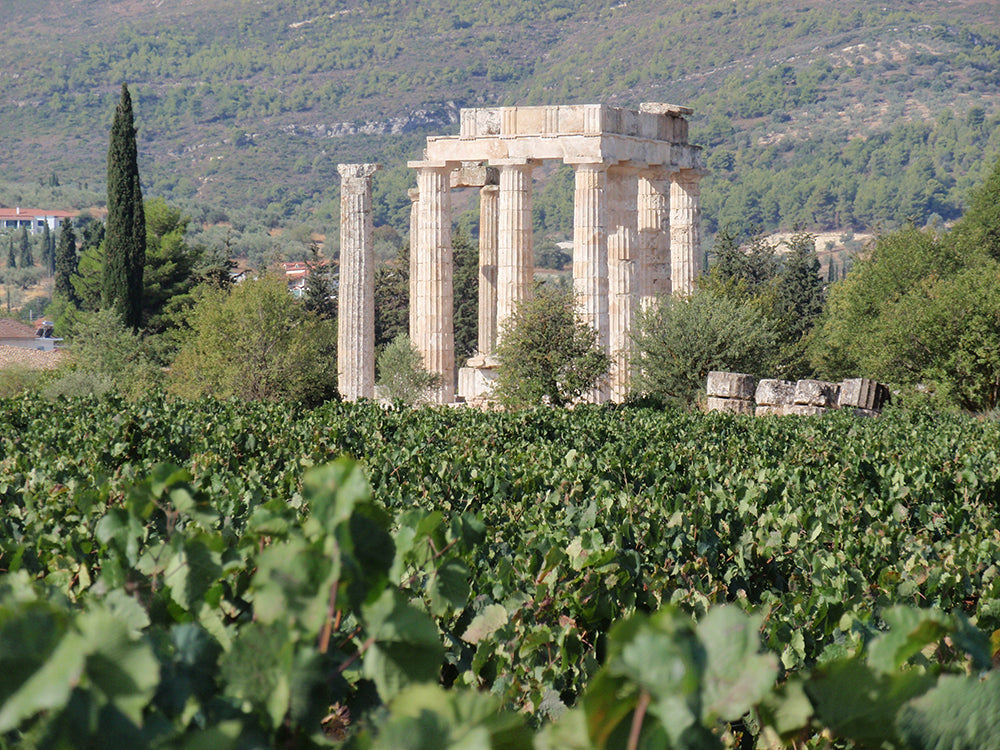Greek Rosé
The Greeks have been making wine for a really long time. They have also been making rosé longer than anyone else. While there is evidence of winemaking in Greece going back as far as 6,500 years, when the first wild grape vines were domesticated in northern Greece, the first documented histories of wine in the region can be traced to the Minoans of the island of Crete and the Mycenaeans of Peloponnese around the 15th century BC. During the Classical period, Greece even developed advanced grape growing techniques that would be familiar to viticulturists today such as lowering yields to produce higher quality wines and studying various types of soils to find the most suitable for growing local varietals.
Much of this early wine was rosé of a sort. Field blends of white and red grapes would be crushed by foot and put into large clay containers to ferment. This pink, oxidated, off-dry and slightly tannic wine would then be diluted with water to create a lighter, easier-drinking wine. This wine was so popular that it was considered barbaric to drink undiluted wine. Even while the Greeks and Romans experimented with making separate wines from red and white grapes, this style stayed favored, as those early red ones were often overly tannic and difficult to drink. The technique even spread north in the 6th century BC when the Phocaeans, people from an ancient Ionian Greek city on the western coast of Anatolia (modern day Turkey), migrated to what is now Marseille, in France. They brought grape vines with them and made the same pink blend of red and white grapes there, leaving a thriving example for the Romans to follow when they landed in Provence a few thousand years later.
While Greek wine remained popular well into the Byzantine Empire, more recent Hellenistic viticulture has gone through a series of rough patches, including Ottoman rule, phylloxera, and World War 2, with adverse effects on quality, until the early 70s saw the categorization of the wines by designation of origin. This focus on local standards sparked a renaissance of Greek wine, empowering smaller producers and growers over the last few decades to make distinct wines with a deep sense of place. This month we will be focusing on rosé from two such producers that have been producing wine from indigenous Greek varietals.
Think Pink!
Justin Malesheetz
|
Semeli Mountain Sun Rosé 2024 |
||
|
Region: Korinthia, Greece |
About the vineyard: Located in the hilly Koutsi region of Nemea, these vineyards are at a higher elevation, between 500-600 meters (between 1,640 and 1,968 feet), on sloping clay soils. The Semeli Estate spans 250 acres, and they also source grapes from other growers within Koutsi, as well as the neighboring areas of Asprokampos, Kastraki and Ancient Nemea. About the winemaking: Made from 100% Agiorgitiko, a thin-skinned varietal indigenous to the Peloponnese region of Nemea, known for its deeply colored reds and an ability to be made into a range of styles, from ageworthy reds to dessert wine made from dried grapes similar to the Recioto wines made in Valpolicella. The grapes are handpicked to ensure quality and chilled to 7-8°C (44.6-46.4°F) to preserve aromatic compounds within the grapes before being destemmed and put into gravity flow tanks, allowing for gentler extraction and protecting the wine from being exposed to too much oxygen at this point in the process. The wine undergoes a 6-hour cold maceration and ferments in stainless steel tanks at 14-16°C (57.2-60.8°F). The wine is then left to mature on the fine lees for three months. Tasting notes: Pink with a rose-y red hue at the rim, the aromas of ripe cherry and strawberry immediately jump out of the glass, followed by notes of nutmeg and dried thyme leaves. Fuller-bodied and dry, with the roundness and richness of red cherry fruit framed by a ginger spiciness and vibrant acidity with a long juicy finish. |
|
|
Winemaker: Yiannis Flerianos |
||
|
Price per bottle/Price per case: $18.99 btl/ $205.09 |
||
|
Suggested Food Pairing: Grilled octopus, younger firm cheeses like Cotija and Feta, fried anchovies, trout rillette |
||
|
Oenops Apla Rosé 2023 |
||
|
Region: Drama, Greece |
About the winery: Oenops is the brainchild of winemaker Nikos Karatzas, an enologist trained in Bordeaux who was the winemaker at Ktima Pavlidis from 2006 to 2015. As a negociant, Nikos does not own any vineyards himself, instead creating partnerships with vineyards and grape growers that share his philosophy in organic viticulture throughout Greece to create his wines. About the winemaking: 50% Xinomavro, 30% Mavroudi, and 20% Liminiona from sites across Drama and Macedonia. The grapes are chilled and meticulously sorted before being pressed via a pneumatic press with a small amount of whole cluster to provide structure and enhance aromatics. The wines from each plot are then fermented separately in a combination of stainless steel and concrete tanks and aged for 2-3 months on the lees before being bottled. Tasting notes: A pale, light salmon in the glass, with notes of strawberry, tangerine, tomato and bay leaf, and a bit of a tropical guava note. Medium-bodied with a bright, tart acidity. Flavors of tangerine, strawberry, and fresh raspberry linger on the palate with a long, citrusy salinity on the bone-dry finish. Reviews: “Ethereally pale with aromas of blood orange, ginger and rosemary. A blend with impeccable definition, subtle grip and moreishness as it opens. Like all Oenops wines I've tasted, the finish is notably long, and for an introduction to one of the great wineries of Greece this delivers a stack of entertainment. As a well-picked quote from Charlie Chaplin on the label says: 'Simplicity is not a simple thing'.” - Ollie Smith, Decanter |
|
|
Winemaker: Nikos Karatzas |
||
|
Price per bottle/Price per case: $21.99 btl $237.49 |
||
|
Suggested Food Pairing: Grilled salmon, Greek salad, soft goat cheese, as an aperitif |
||





